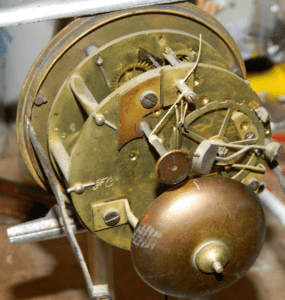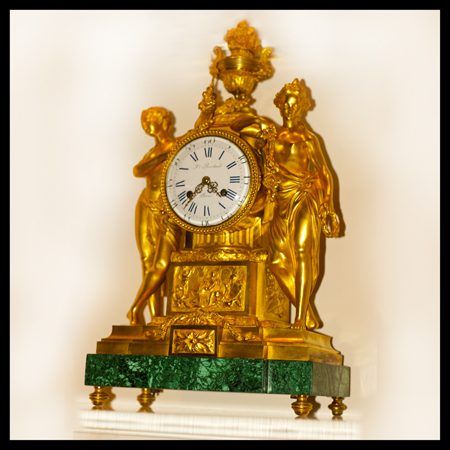Why Collectors Treasure the Antique French Clock
An antique French clock is more than a functional timepiece—it is a masterpiece that embodies centuries of craftsmanship, culture, and elegance. For generations, these clocks have been admired for their intricate details, fine artistry, and historical value. Whether found in stately homes, prestigious auctions, or private collections, each clock offers a glimpse into the refinement of past eras. Collectors and enthusiasts alike recognize that owning one is not only about keeping time but also about preserving heritage.
Origins of the Antique French Clock
France emerged as a leading force in clockmaking as early as the seventeenth century, and Paris quickly became the center of innovation and design. The antique French clock often reflected the aesthetics of its time, from the elaborate Rococo flourishes of the eighteenth century to the neoclassical and Empire styles that followed. Renowned artisans combined technical mastery with artistic creativity, producing pieces that blended precision with beauty. Many antique clocks were created for royalty and aristocracy, ensuring their designs carried an aura of luxury and exclusivity.
Materials and Craftsmanship That Stand Out
The craftsmanship of an antique French clock is one of its defining features. Skilled artisans used gilt bronze, fine marquetry, marble, and porcelain to create clocks that doubled as decorative showpieces. Sculpted cases often depicted mythological figures, floral garlands, or architectural motifs, giving each clock a distinctive personality. The mechanisms themselves were engineered with remarkable precision, ensuring accurate timekeeping even centuries ago. When displayed today, the gleaming finishes and delicate artistry of these clocks still command admiration, showcasing why they remain enduring symbols of elegance.
Popular Styles Through the Centuries
One of the fascinating aspects of collecting an antique French clock is the variety of styles that reflect changing tastes over time. The Louis XIV era favored bold, ornate designs with heavy gilding. Under Louis XV, the Rococo style introduced flowing curves and playful motifs, while the Louis XVI period leaned toward neoclassical symmetry and refinement. During the Napoleonic Empire period, strong lines and classical references became dominant. Each style provides not only a beautiful timepiece but also a snapshot of French cultural history, making the antique clock a versatile collectible.
Value in Today’s Market
Collectors and interior designers seek out antique French clocks for their blend of functionality and artistry. The value of these clocks can vary widely, depending on condition, rarity, provenance, and the reputation of the maker. Well-preserved examples by famous horologists often command high prices at auctions. However, even lesser-known pieces retain strong appeal because they bring timeless charm to any space. In today’s market, an antique clock can be considered both a decorative investment and a historical artifact that continues to appreciate over time.
How to Identify Authenticity
For those interested in acquiring an antique French clock, understanding authenticity is crucial. Signs of true age, such as patina on the metalwork, wear consistent with centuries of use, and hand-finished details, often separate genuine pieces from reproductions. Many authentic clocks are signed by the maker on the dial or movement. Consulting experts, obtaining documentation, and purchasing through reputable dealers are recommended steps to ensure that a clock is truly antique and not a modern replica. Authenticity not only protects the investment but also preserves the integrity of a collection.
Placement and Decorative Appeal
Beyond its historical value, the antique French clock adds unparalleled decorative appeal to interiors. Placed on a mantel, console table, or in a grand foyer, it becomes an immediate focal point. Its combination of artistry and function complements both traditional and contemporary settings, offering a touch of Old World sophistication. Interior designers often incorporate these clocks into elegant décor schemes to introduce a sense of heritage and refinement. An antique clock not only tells time but also transforms an ordinary room into a statement of cultured taste.
Caring for an Antique French Clock
Proper care ensures that your clock retains its beauty and function for generations. Regular dusting, gentle cleaning of gilt surfaces, and occasional professional servicing of the movement are essential. Avoiding harsh chemicals and maintaining a stable environment free of excessive humidity or heat helps protect delicate finishes. With attentive care, these clocks remain reliable timekeepers and captivating works of art, continuing to inspire admiration long after they were created.
Why Collectors Treasure the Antique French Clock
An antique French clock is more than a functional timepiece—it is a masterpiece that embodies centuries of craftsmanship, culture, and elegance. For generations, these clocks have been admired for their intricate details, fine artistry, and historical value. Whether found in stately homes, prestigious auctions, or private collections, each clock offers a glimpse into the refinement of past eras. Collectors and enthusiasts alike recognize that owning one is not only about keeping time but also about preserving heritage.
Origins of the Antique French Clock
France emerged as a leading force in clockmaking as early as the seventeenth century, and Paris quickly became the center of innovation and design. The French clock often reflected the aesthetics of its time, from the elaborate Rococo flourishes of the eighteenth century to the neoclassical and Empire styles that followed. Renowned artisans combined technical mastery with artistic creativity, producing pieces that blended precision with beauty. Many antique clocks were created for royalty and aristocracy, ensuring their designs carried an aura of luxury and exclusivity.
Materials and Craftsmanship That Stand Out
The craftsmanship of an antique clock is one of its defining features. Skilled artisans used gilt bronze, fine marquetry, marble, and porcelain to create clocks that doubled as decorative showpieces. Sculpted cases often depicted mythological figures, floral garlands, or architectural motifs, giving each clock a distinctive personality. The mechanisms themselves were engineered with remarkable precision, ensuring accurate timekeeping even centuries ago. When displayed today, the gleaming finishes and delicate artistry of these clocks still command admiration, showcasing why they remain enduring symbols of elegance.
Popular Styles Through the Centuries
One of the fascinating aspects of collecting antique French clocks is the variety of styles that reflect the changing tastes of the time. The Louis XIV era favored bold, ornate designs with heavy gilding. Under Louis XV, the Rococo style introduced flowing curves and playful motifs, while the Louis XVI period leaned toward neoclassical symmetry and refinement. During the Napoleonic Empire period, strong lines and classical references became dominant. Each style provides not only a beautiful timepiece but also a snapshot of French cultural history, making the clock a versatile collectible.
Value in Today’s Market
Collectors and interior designers seek out antique French clocks for their blend of functionality and artistry. The value of these clocks can vary widely, depending on condition, rarity, provenance, and the reputation of the maker. Well-preserved examples by famous horologists often command high prices at auctions. However, even lesser-known pieces retain strong appeal because they bring timeless charm to any space. In today’s market, a clock can be considered both a decorative investment and a historical artifact that continues to appreciate over time.
How to Identify Authenticity
For those interested in acquiring a French clock, understanding authenticity is crucial. Signs of actual age, such as patina on the metalwork, wear consistent with centuries of use, and hand-finished details, often separate genuine pieces from reproductions. The maker signs many authentic clocks on the dial or movement. Consulting experts, obtaining documentation, and purchasing through reputable dealers are recommended steps to ensure that a clock is truly antique and not a modern replica. Authenticity not only protects the investment but also preserves the integrity of a collection.
Placement and Decorative Appeal

Beyond its historical value, the French clock adds unparalleled decorative appeal to interiors. Placed on a mantel, console table, or in a grand foyer, it becomes an immediate focal point. Its combination of artistry and function complements both traditional and contemporary settings, offering a touch of Old World sophistication. Interior designers often incorporate these clocks into elegant décor schemes to introduce a sense of heritage and refinement. An antique clock not only tells time but also transforms an ordinary room into a statement of cultured taste.
Caring for an Antique Clock
Proper care ensures that your clock retains its beauty and function for generations. Regular dusting, gentle cleaning of gilt surfaces, and occasional professional servicing of the movement are essential. Avoiding harsh chemicals and maintaining a stable environment free of excessive humidity or heat helps protect delicate finishes. With attentive care, these clocks remain reliable timekeepers and captivating works of art, continuing to inspire admiration long after they were created.
The Enduring Legacy
The antique French clock embodies the intersection of art, history, and horology. Each piece carries the legacy of French craftsmanship and design excellence, making it more than just a collectible—it is a testament to centuries of cultural achievement. For collectors, enthusiasts, or those simply seeking a statement piece for their home, the antique clock remains a timeless treasure. Its enduring beauty ensures that it will always hold a place of honor, symbolizing refinement and the pursuit of elegance across generations, and it embodies the intersection of art, history, and horology.
Each piece carries the legacy of French craftsmanship and design excellence, making it more than just a collectible—it is a testament to centuries of cultural achievement. For collectors, enthusiasts, or those simply seeking a statement piece for their home, the French clock remains a timeless treasure. Its enduring beauty ensures that it will always hold a place of honor, symbolizing refinement and the pursuit of elegance across generations.


